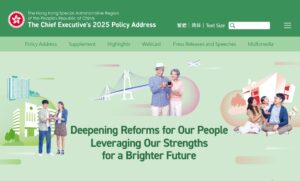Hong Kong’s 2025 Policy Address②: Charting a New Path for Global Competitiveness
The 2025 Policy Address sets out an ambitious blueprint for Hong Kong’s future as it seeks to reinforce its role as a financial powerhouse, expand international connectivity, and diversify into new growth sectors. Far beyond a routine policy update, the measures outlined signal a strategic repositioning of the city within global markets—one that businesses cannot afford to overlook. From expanding capital market access and scaling up green finance, to strengthening logistics, tourism, and professional services, the government is sending a clear message: Hong Kong intends to remain indispensable to regional and international commerce.
This article provides a business-focused analysis of the 2025 Policy Address, highlighting how Hong Kong’s new strategies in finance, trade, logistics, and industry-specific development are set to reshape the city’s role as a global hub, while outlining the key opportunities and challenges that companies, employers, and employees should prepare for.
Strengthening International Connectivity and Trade
The 2025 Policy Address reaffirms Hong Kong’s role as a gateway for global commerce and outlines policies that will reinforce its connectivity across Asia and beyond. For businesses, this means new opportunities to expand operations, diversify markets, and improve supply chain resilience in a shifting international landscape.
Expanding Trade Networks
Beyond the GBA, Hong Kong is broadening its trade relationships. The Policy Address emphasizes closer engagement with ASEAN economies, leveraging both the China-ASEAN Free Trade Agreement and the Regional Comprehensive Economic Partnership (RCEP). These frameworks provide lower tariffs, simplified compliance, and preferential access to Southeast Asian markets where demand for consumer goods, digital solutions, and infrastructure is expanding rapidly.
At the same time, Hong Kong is increasing participation in the Belt and Road Initiative (BRI). The government intends to promote Hong Kong’s strengths in infrastructure finance, arbitration, and project management to support BRI economies. Engineering firms, financial institutions, and professional services companies are positioned to secure roles in large-scale international projects that require both funding and high-standard governance.
Modernizing Logistics and Supply Chains
Trade expansion depends on efficiency, and Hong Kong is investing in next-generation logistics capacity. Planned upgrades include smart port technologies, expanded air cargo handling, and digitized customs systems. These improvements aim to solidify Hong Kong’s role as a high-value logistics hub, especially for industries such as pharmaceuticals, electronics, and luxury goods that demand speed and reliability.
For multinational corporations, modernized infrastructure will help reduce transaction costs, minimize disruptions, and increase visibility across supply chains. Local small and medium enterprises (SMEs) can also gain from greater access to cross-border e-commerce platforms, lowering barriers to entry for international trade.
Implications for Businesses
For the business community, the message is clear: Hong Kong is doubling down on its role as a connector of global trade and investment flows. Companies should evaluate how they can align with this agenda by:
- Positioning within the GBA to access broader markets and supply chains.
- Expanding into ASEAN economies where consumer and infrastructure growth is accelerating.
- Leveraging logistics upgrades to build more resilient and competitive supply networks.
- Exploring Belt and Road projects as service providers, financiers, or strategic partners.
By integrating these considerations into strategic planning, companies can capture new opportunities while strengthening their role in Hong Kong’s evolving economic landscape. The Policy Address indicates that government support will continue to focus on regional connectivity, efficiency, and diversification—key themes that businesses cannot afford to overlook.
Financial Services, Innovation, and Technology Development
The Policy Address underscores Hong Kong’s intention to consolidate its role as a leading financial and innovation hub, while at the same time diversifying into new sectors that can sustain long-term growth. For businesses, the measures outlined signal expanded access to financing, support for technology adoption, and greater opportunities to participate in emerging industries.
Reinforcing Financial Leadership
Hong Kong’s reputation as an international financial center continues to be a strategic asset. The government is pursuing initiatives to broaden the scope of financial products and services, ensuring the city remains competitive against regional and global peers.
Key directions include:
- Deepening capital markets
Expanding the range of listed securities and enhancing cross-border connectivity with Mainland exchanges. - Insurance and risk management
Developing new insurance-linked products and strengthening Hong Kong’s role as a reinsurance hub for Asia. - Asset and wealth management
Encouraging global investors to use Hong Kong as a base for regional asset allocation, particularly in connection with GBA opportunities.
For corporate leaders, these policies reinforce Hong Kong’s position as a financing platform for expansion in Asia, enabling companies to tap diverse funding sources and risk management tools.
Growth of Green Finance
A particularly important focus is the expansion of green and sustainable finance. Building on earlier groundwork, the government plans to issue more green bonds, set clearer taxonomies for sustainable investments, and enhance disclosure standards. These steps will help companies access funding for environmentally responsible projects, from renewable energy to sustainable transport.
For businesses, this represents both an opportunity and a responsibility: organizations that align with ESG standards will find it easier to raise capital, while those that lag behind may face higher costs of financing.
Fintech and Digital Assets
The Policy Address also points to the rapid development of financial technology (fintech) and digital assets. Measures include:
- Piloting tokenization of financial products, opening new channels for investment and trading.
- Supporting virtual asset service providers under a clear regulatory regime.
- Promoting the use of digital payment systems to increase efficiency in both retail and cross-border transactions.
These initiatives are designed to create a regulated yet innovative environment, giving companies confidence to engage in digital asset markets while protecting investors.
Business Implications
The overall direction is clear: Hong Kong intends to remain a financial powerhouse while deepening its role in innovation-driven growth. Companies should take note of the following opportunities:
- Leverage Hong Kong’s capital markets for expansion and international fundraising.
- Access green finance instruments to support sustainability projects and demonstrate ESG alignment.
- Adopt fintech and digital asset solutions to improve efficiency and access new investment channels.
- Engage in innovation ecosystems that benefit from government support and cross-border collaboration.
For companies in both traditional and emerging industries, these policies create a more supportive environment to innovate, finance, and scale across regional and global markets.
Industry-Specific Development Strategies
The 2025 Policy Address does not only set broad directions for connectivity and finance but also outlines sectoral strategies aimed at strengthening Hong Kong’s competitive edge across key industries. These initiatives are designed to reinvigorate tourism, expand logistics and aviation, and elevate cultural and professional services, creating opportunities for companies across a wide spectrum of activities.
Revitalizing Tourism and MICE
Tourism remains a cornerstone of Hong Kong’s economy, and the government is pursuing measures to reposition the city as a premier international destination. Beyond traditional sightseeing, emphasis will be placed on the MICE (Meetings, Incentives, Conventions, and Exhibitions) sector, which is expected to rebound strongly as global business travel resumes.
Plans include:
- Expanding convention facilities to attract world-class events.
- Introducing new cultural and entertainment experiences to diversify Hong Kong’s tourism appeal.
- Developing regional tourism partnerships, especially within the Greater Bay Area, to promote multi-destination itineraries.
For hospitality, retail, and event management firms, these policies suggest renewed demand for services and a chance to capture spillover benefits from international conferences and exhibitions.
Logistics and Aviation
The Policy Address also highlights the critical role of logistics and aviation in sustaining Hong Kong’s position as a global trade hub. Beyond the broad logistics modernization covered earlier, sector-specific initiatives focus on expanding air cargo capacity and reinforcing aviation services.
Key measures include:
- Completing capacity upgrades at the airport, with an emphasis on high-value and time-sensitive goods.
- Enhancing multimodal transport connections that link air, sea, and land routes.
- Encouraging digital solutions for supply chain management, such as blockchain-based tracking systems.
These strategies create opportunities for logistics providers, airlines, and technology firms to deliver more efficient, transparent, and reliable services, positioning Hong Kong as a preferred hub for global trade flows.
Maritime and Shipping Services
As a traditional strength, maritime services also receive government attention. Efforts will focus on consolidating Hong Kong’s role as a regional hub for ship finance, insurance, and arbitration, while supporting adoption of greener technologies in shipping. Companies engaged in ship management, legal services, and marine engineering may benefit from these initiatives, particularly as environmental standards drive demand for sustainable solutions.
Cultural, Creative, and Professional Services
To diversify beyond traditional industries, the Policy Address highlights cultural and creative industries as engines of soft power and innovation. Investment in film, design, digital content, and the arts is expected to enhance Hong Kong’s international brand and create new commercial avenues.
Meanwhile, professional services—from legal and accounting to architecture and consulting—remain a critical part of Hong Kong’s economic strategy. The government aims to expand their international reach, particularly in ASEAN and Belt and Road markets, where demand for high-standard services continues to grow.
Implications for Businesses
The sector-specific initiatives outlined in the Policy Address provide companies with clear signals on where demand is likely to grow. Businesses should consider:
- Hospitality and event firms
prepare for increased activity in tourism and MICE. - Logistics and aviation operators
align operations with infrastructure and technology upgrades. - Maritime service providers
develop expertise in ship finance, arbitration, and sustainability solutions. - Creative and professional services firms
leverage Hong Kong’s brand to expand into new international markets.
For employers and employees alike, these initiatives indicate a policy environment supportive of industry renewal, diversification, and global outreach. Companies that align strategies with these trends can capture growth while enhancing Hong Kong’s position as a multifaceted international hub.
Regional and Global Positioning
A consistent theme of the 2025 Policy Address is Hong Kong’s ambition to deepen its international engagement and reinforce its position as a bridge between Mainland China and the global economy. The government is pursuing a multi-pronged strategy that emphasizes regional integration, global partnerships, and talent attraction—elements that directly affect how businesses should plan their long-term growth.
Strengthening Regional Partnerships
The Policy Address stresses that Hong Kong must play a proactive role in ASEAN, RCEP, and Belt and Road frameworks. Each of these platforms opens pathways for businesses:
- ASEAN
With rapid economic growth and urbanization in Southeast Asia, Hong Kong companies are encouraged to pursue partnerships in infrastructure, digital trade, and financial services. - RCEP
As the world’s largest free trade agreement, RCEP creates an environment of lower tariffs and simplified compliance that Hong Kong businesses can leverage to scale across Asia-Pacific markets. - Belt and Road Initiative (BRI)
Hong Kong will expand its support for BRI economies by exporting expertise in finance, law, dispute resolution, and project management. This is particularly relevant for firms in engineering, consulting, and capital markets.
Together, these partnerships strengthen Hong Kong’s role as a connector of markets, ideas, and capital flows.
Expanding Global Networks
Beyond Asia, Hong Kong is seeking to broaden its global footprint. The Policy Address highlights the importance of deepening ties with Europe, the Middle East, and emerging markets in Africa and Latin America. For businesses, this expansion creates a wider arena in which Hong Kong’s services and expertise can be deployed.
The government is also advancing new agreements on double taxation avoidance, investment protection, and financial cooperation, which reduce risks for companies engaging in cross-border operations. This framework provides multinational corporations with greater certainty when using Hong Kong as a base for global expansion.
Reinforcing the “Gateway to China” Role
A recurring theme is Hong Kong’s position as a trusted gateway to Mainland China. The government is reinforcing its role as a platform for foreign companies entering China and for Mainland firms seeking to go global. This dual function underscores Hong Kong’s unique value proposition: a jurisdiction that combines international standards of governance with close access to the Chinese market.
This positioning benefits businesses in financial services, logistics, technology, and professional services that can offer solutions bridging both worlds. It also strengthens Hong Kong’s brand as a city where global capital, ideas, and talent converge.
Implications for Businesses
The global positioning strategy outlined in the Policy Address has clear implications:
- Regional expansion
Companies should explore ASEAN and RCEP markets where growth and integration are accelerating. - Global diversification
Firms should consider how Hong Kong’s expanding global agreements can support entry into Europe, the Middle East, and emerging economies. - Talent strategies
Employers should leverage streamlined immigration and support services to attract skilled professionals. - China gateway advantage
Businesses should market Hong Kong’s unique status to clients and partners as both a launchpad into China and a platform for internationalization.
For the business community, these developments confirm that Hong Kong is not retreating from globalization but actively reshaping its global role. The Policy Address signals strong government backing for companies that align with this international strategy, ensuring that Hong Kong continues to serve as a dynamic bridge between Mainland China and the wider world.
Summary
The 2025 Policy Address shows that Hong Kong is evolving beyond its traditional identity as a financial hub to become a diversified engine of global commerce. For businesses, this shift opens doors to new markets through ASEAN and RCEP, expands access to sustainable and digital finance, and revitalizes opportunities in tourism, logistics, and creative sectors. Companies that anchor themselves in Hong Kong gain both flexibility in market access and diversity in funding options. In this way, the Policy Address is more than a government roadmap—it provides a practical foundation for enterprises to build competitive advantage on the international stage.
Feel free to contact us
MAY Planning provides advice on regulatory and implementation for fintech and digital assetst in Hong Kong. We also offer support on market entry strategies for ASEAN and RCEP economies.
References:
1)The Chief Executive’s 2025 Policy Address. (n.d.). The Hong Kong Special Administrative Region of the People’s Republic of China. https://www.policyaddress.gov.hk/2025/en/


